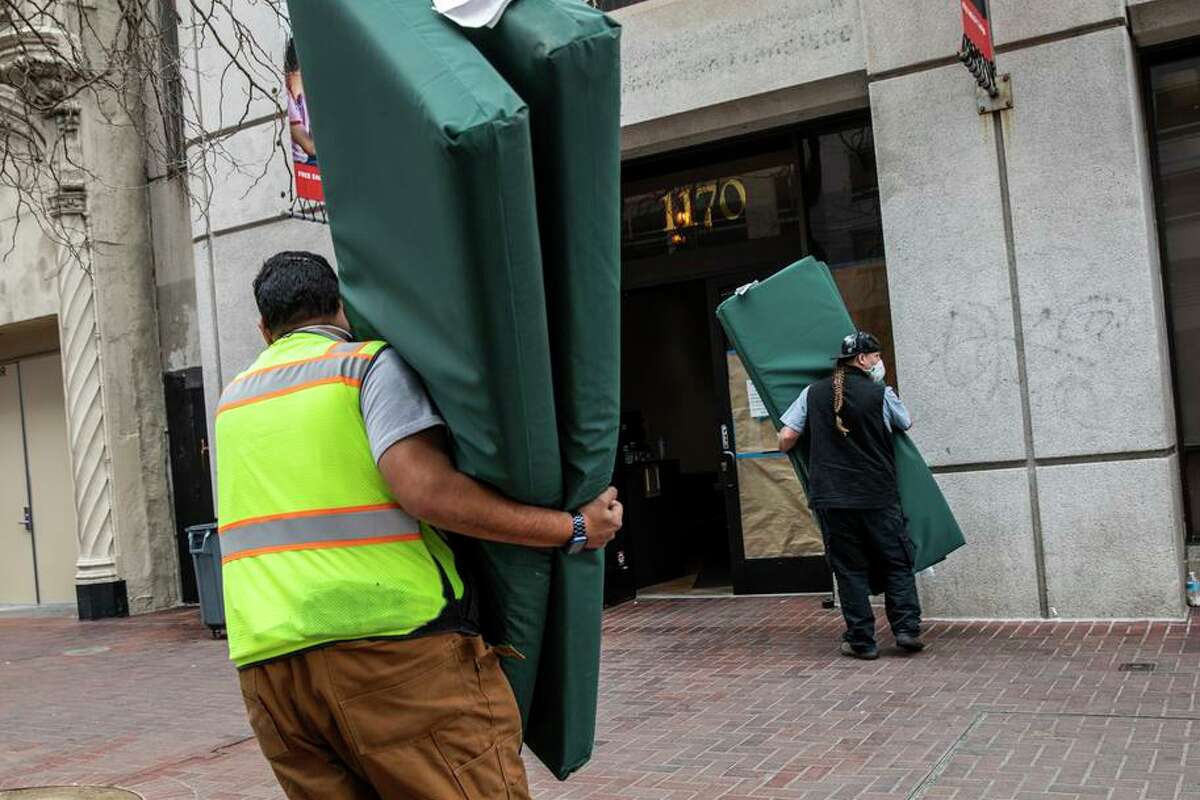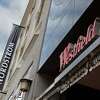This is a carousel. Use Next and Previous buttons to navigate
San Francisco opened a linkage center at U.N. Plaza on Tuesday to connect people in theTenderlointo housing, drug treatment and other services, a major component of Mayor London Breed’s initiative to address conditions and overdose deaths in the neighborhood.
The city said anyone can come in off the street to 1170 Market St. to get food or clothing or to bathe or use the bathroom. They can then get referrals for mental health care, substance use treatment, shelter and other resources.
On Tuesday morning, fences encircling the outdoor area of the linkage center had signs advertising it: “Come as you are. Help starts here.”
外展工作人员就会分发传单广告the linkage center and help transport people there. Up to 50 people, plus staff, can stay inside at a time because of the current COVID-19 surge, but that will increase to 100. Mary Ellen Carroll, director of the emergency department leading the crisis response, said Tuesday morning she was “super hopeful” the center could provide people with resources and happy some had already come in to rest or get connected to detox.
The center’s launch was hastened by Breed’sdeclaration of a state of emergency last monthrelated to overdose deaths in the Tenderloin. The declaration allowed the city to forgo a lengthy process to open the site. The center is the most noticeable change under the mayor’s initiative and key to its success. Advocates and officials broadly support the idea — unique among existing city resources because it brings together multiple services into an easily accessible one-stop shop — but some are wary the police will be involved in getting people there.
Last month, Breed said twice that people using drugs on the street would either have the option of going to the linkage center or to jail. However, on Tuesday outside the center, police Captain Chris Canning and Carroll said that police wouldn’t force people into treatment or automatically arrest them if they didn’t go to the center right now.
When asked what police would do if someone didn’t want to go, Canning said it depended on the reason for contact.
“People that break the laws face arrest anyways,” he said. “There is no plan and there is no direction for police officers to compel people to get treatment instead of taking an enforcement approach. ... They can tell people there are these resources. There is a collaborative approach, but not one of compulsion.”
Carroll said she asked police to focus on violent and serious crimes, while public health and social workers lead outreach to serve people with substance use disorders.
“We are absolutely trying to send a message that open-air drug use is not something that is going to be acceptable in the Tenderloin moving forward and we are trying to offer people services,” she said. “At this point, it’s voluntary and we’re not throwing people in jail or doing anything like that.”
So far, the number of police in the Tenderloin hasn’t increased because of budget and staffing shortages, but the mayor last weekheld her ground on herapproach. Carroll didn’t rule out the possibility police would be more involved if staffing and budget increase.
“This is our strategy we are going to start with, and we’ll see how it goes,” Carroll said.
Just before the center opened at 8 a.m., three police cars were parked on U.N. Plaza, and a couple of officers approached a man sitting on the opposite site of the plaza from the center. The man, Claire Rummel, got up after he said officers told him what they tell him nearly every day — that he can’t “hang out.”
That day he hoped would be different, as he waited to enter the linkage center. The first thing he wanted? A haircut, he said. (City staff said haircuts weren’t available on site, but he could get a referral).

Workers carry cushion mats into Tenderloin Linkage Center at United Nations Plaza ahead of its opening in San Francisco, Calif. Tuesday, Jan. 18, 2022. The center, part of the City’s Tenderloin emergency declaration, plans to provide people on the streets with treatment, housing and resources.
Stephen Lam / The Chronicle
A worker pushes a portable toilet into Tenderloin Linkage Center at United Nations Plaza ahead of its opening in San Francisco, Calif. Tuesday, Jan. 18, 2022. The center, part of the City’s Tenderloin emergency declaration, plans to provide people on the streets with treatment, housing and resources.
Stephen Lam, photographer / The ChronicleRummel said he couldn’t remember the last time he had a haircut, or a shower or bed, for that matter. The 60-year-old has been homeless for 30-odd years and got on a housing list a year ago, but nothing happened. He hoped the linkage center would help him, although after he went off in the direction of City Hall, The Chronicle didn’t observe him coming in over the next few hours.
When asked whether it was common practice to ask people on the plaza to move, Canning didn’t directly answer, but said, “Anytime we engage with people, we try to see if they need help” as well as deal with people breaking the law.
After the center opened at 8 a.m., people began to trickle in and out.
马克斯•帕金森推着坐在轮椅上的朋友ut of the center around 11 a.m., said it was a nice, clean building with friendly staff. He showed off a bag of popcorn, hamburger, water and pack of socks, and said he was put on a list for housing — the first time in eight months he’s been living in the city after he left a friend’s house in Clearlake (Lake County).
Parkinson plans to return to the center Wednesday and tell other people to come and get help. He recently started methadone for his drug use and got an ID that he hopes will help him secure a job. Once he stabilizes, he wants to reunite with his two sons, ages 6 and 8, either in Las Vegas where they live or here. He doesn’t want to meet the same fate as his dad and brother-in-law, who both died of overdoses.
Reporters are not allowed inside the center for now, but city staff said once someone goes inside, the client is greeted by a community ambassador who asks a few questions, such as their name and what they need. Staff from the health department, the homelessness department, the human services agency, probation and nonprofits are onsite.
One of them is drug treatment provider HealthRight360, which has a small team to monitor safety in the bathrooms and help people. Last month, the organization hosted a news conference with the district attorney and public defender denouncing the mayor’s call to arrest drug users who don’t accept help and pushing for more services.
“We had concerns,” Vitka Eisen, president and CEO, said on Tuesday, “but at the end of the day, people are dying from drug overdoses, and our job is to stop that.”
Also outside the center Tuesday, Supervisor Matt Haney said even though people had concerns about the broader emergency initiative, “everyone should be for this.”
The idea of a drop-in center is similar to what was outlined in MentalHealthSF legislation, which Haney co-authored, meant to overhaul the city’s behavioral health care system. The sweeping reforms havebeen slow to roll out.The Tenderloin emergency initiative is now fulfilling some promises of that legislation by creating a center, better coordinating and filling service gaps, and more quickly hiring 200 vacant positions in behavioral health.
Much of the Tenderloin on Tuesday morning looked as it normally does. The blocks watched by community ambassadors were mostly clean and clear, and the strips without ambassadors were as crowded as last week, with people sleeping in tents or sitting on the sidewalk, using drugs or selling goods they admitted were stolen.
Terrance King, sitting along U.N. Plaza, said that more police were out, but they hadn’t done anything other than tell him that he can’t hang around as they usually do. He also had an outreach worker offer him housing in the morning. He had an 8:30 a.m. appointment, but just before 10 a.m. was surprised to learn that he had missed it. He said he had not heard about the linkage center and what it was offering although he was sitting across the plaza from it.
When Captain Canning and another police officer standing between King and the fountain walked away, King lit up.
Mallory Moench is a San Francisco Chronicle staff writer. Email:mallory.moench@sfchronicle.comTwitter: @mallorymoench




















